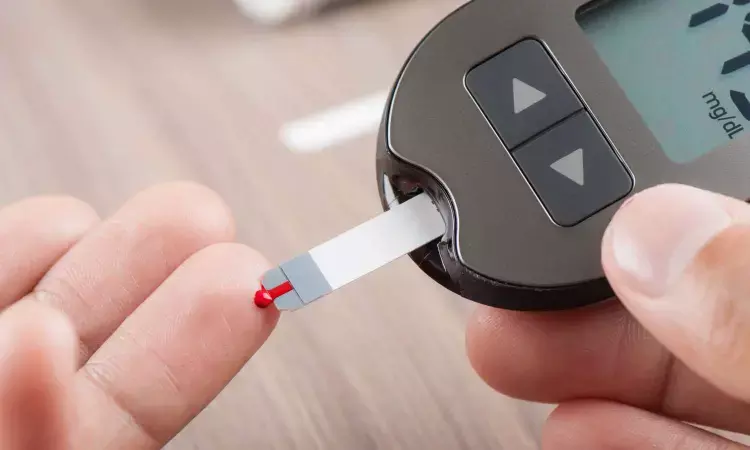- Home
- Medical news & Guidelines
- Anesthesiology
- Cardiology and CTVS
- Critical Care
- Dentistry
- Dermatology
- Diabetes and Endocrinology
- ENT
- Gastroenterology
- Medicine
- Nephrology
- Neurology
- Obstretics-Gynaecology
- Oncology
- Ophthalmology
- Orthopaedics
- Pediatrics-Neonatology
- Psychiatry
- Pulmonology
- Radiology
- Surgery
- Urology
- Laboratory Medicine
- Diet
- Nursing
- Paramedical
- Physiotherapy
- Health news
- Fact Check
- Bone Health Fact Check
- Brain Health Fact Check
- Cancer Related Fact Check
- Child Care Fact Check
- Dental and oral health fact check
- Diabetes and metabolic health fact check
- Diet and Nutrition Fact Check
- Eye and ENT Care Fact Check
- Fitness fact check
- Gut health fact check
- Heart health fact check
- Kidney health fact check
- Medical education fact check
- Men's health fact check
- Respiratory fact check
- Skin and hair care fact check
- Vaccine and Immunization fact check
- Women's health fact check
- AYUSH
- State News
- Andaman and Nicobar Islands
- Andhra Pradesh
- Arunachal Pradesh
- Assam
- Bihar
- Chandigarh
- Chattisgarh
- Dadra and Nagar Haveli
- Daman and Diu
- Delhi
- Goa
- Gujarat
- Haryana
- Himachal Pradesh
- Jammu & Kashmir
- Jharkhand
- Karnataka
- Kerala
- Ladakh
- Lakshadweep
- Madhya Pradesh
- Maharashtra
- Manipur
- Meghalaya
- Mizoram
- Nagaland
- Odisha
- Puducherry
- Punjab
- Rajasthan
- Sikkim
- Tamil Nadu
- Telangana
- Tripura
- Uttar Pradesh
- Uttrakhand
- West Bengal
- Medical Education
- Industry
New Artificial pancreas successful in young children with type 1 diabetes: PEDAP trial

USA: Recent data from the PEDAP trial have shown that in young children with type 1 diabetes, artificial pancreas technology improved blood glucose control.
The findings from the 13-week randomized controlled PEDAP (Pediatric Artificial Pancreas) trial conducted at three pediatric diabetes centres across the United States were published in the New England Journal of Medicine.
The artificial pancreas, also known as closed-loop control, is an “all-in-one” diabetes management system that tracks blood glucose levels using a continuous glucose monitor (CGM) and automatically delivers the insulin when needed using an insulin pump. The system replaces reliance on testing by fingerstick or CGM with insulin delivery by multiple daily injections or a pump controlled by the patient or caregiver.
The trial enrolled 102 participants between ages 2 and 5, a particularly challenging population regarding glycemic control, and randomly assigned them to either the artificial pancreas group or the standard care comparison group. The artificial pancreas group received training on how to use the study device-an insulin pump programmed with Control-IQ insulin dosing technology-and a CGM. The standard care group continued to use their pre-study method of blood glucose management and were trained to use the study CGM.
During the 13 weeks, participants in the artificial pancreas group spent 12% more time-approximately three hours per day within their target blood glucose range compared to the standard care group. The greatest difference in blood glucose control was seen at nighttime, between 10 p.m. and 6 a.m., with artificial pancreas participants spending 18% more time in range than the standard care group. Nighttime control is especially challenging to maintain in children with type 1 diabetes.
Additional measurements of blood glucose control also improved, similar to findings seen in previous artificial pancreas trials in older children and adults.
The trial was conducted at the Center for Diabetes Technology at the University of Virginia, Charlottesville; the Barbara Davis Center for Diabetes at the University of Colorado, Aurora; and Stanford University, Palo Alto, California. Due to emergency pandemic restrictions at the time of the study, more than 80% of the device training and 90% of the study visits occurred virtually, suggesting the technology's suitability for use in remote and underserved areas.
The study also assessed the safety of using the artificial pancreas device in young children. Similar numbers of severe hypoglycemia occurred among both study groups. One instance of diabetic ketoacidosis occurred in the artificial pancreas group due to a problem with the insulin pump tubing called infusion set failure.
Reference:
Wadwa, R.P., et al. Randomized, controlled trial of automated insulin delivery with virtual visits in young children with type 1 diabetes. New England Journal of Medicine. March 16, 2023. DOI: 10.1056/NEJMoa2210834.
Dr Kamal Kant Kohli-MBBS, DTCD- a chest specialist with more than 30 years of practice and a flair for writing clinical articles, Dr Kamal Kant Kohli joined Medical Dialogues as a Chief Editor of Medical News. Besides writing articles, as an editor, he proofreads and verifies all the medical content published on Medical Dialogues including those coming from journals, studies,medical conferences,guidelines etc. Email: drkohli@medicaldialogues.in. Contact no. 011-43720751


